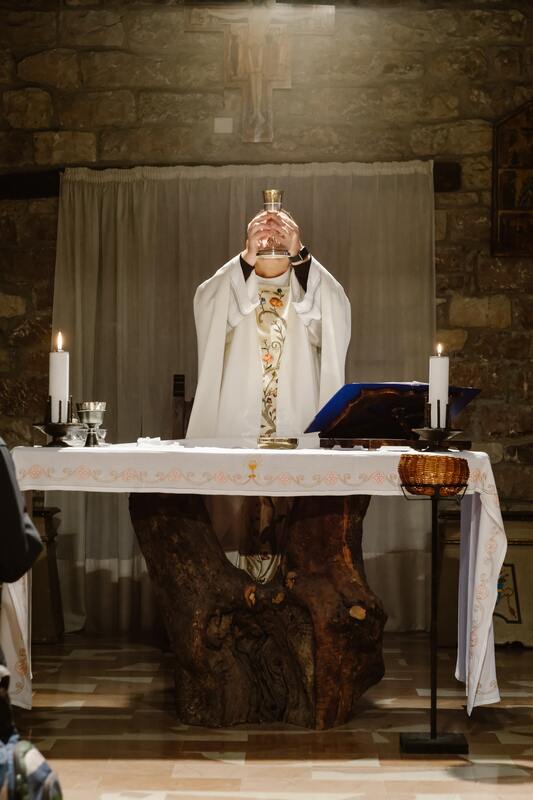|
One of my favorite stories of the Easter Season is the account we just heard of the disciples who set out on the night of that first Easter Sunday for the small town of Emmaus about a seven mile journey from Jerusalem. As they walked along speaking about the events of recent days they were joined by a third companion who entered the conversation and soon began to unfold for them the meaning of all they had experienced.
When the disciples arrived at an inn for the night they imposed upon the stranger to join them for a meal. They sat down and the stranger took the bread, said a prayer of blessing, broke it and gave it to them. At the meal the Word they had heard became the Bread they received. Immediately their eyes were opened and they recognized that the stranger who had joined them was none other than the Risen Jesus himself. Without realizing it, even as they had travelled on, they participated in the second Mass after the Last Supper itself. The pattern of hearing the Word and then sharing the bread, that has become Christ’s Body and the wine that has become Christ’s Blood has provided the basic structure of the Mass since the very beginning. We could take it a step further and say that this pattern for us Catholic Christians provides not only the structure of the Sacrifice and Meal that gives us life, but it is the pattern of our life itself. The entire life of a Christian is a journey in which we reflect on the Word of God, which became Incarnate in Jesus and we are nourished by him. The Mass, in other words, is not simply something we do, the Mass is our very life! The Eucharist sums up the meaning of our lives. I always like to tell the story of a group of martyrs from North Africa. When the Emperor Diocletian put out an edict in the year 304 calling for the death of anyone who persisted in the practice of their Faith as Christians a group of 49 continued to gather for Mass in a town called Abitina. One Sunday they were arrested and brought before the representative of the Emperor. The only thing they were asked was to cease celebrating the Eucharist. The answer they gave was that they could not do this. When the interrogator asked them why, their response was this: “Sine Dominico (esse) non possumus. Intermitti Dominicum non potest.” In other words, “Without the Sunday Eucharist we cannot survive.” Perhaps there are many of you who, after these weeks now without the opportunity to participate in the Mass and receive Holy Communion, understand the words of these holy martyrs more fully. It is true! For us Catholic Christians to live long term without the Sunday Eucharist is inconceivable. There have always been situations that have required people to live for a time without regular participation in the Mass. When we are sick often we are unable to go to Mass. In fact, if we are contagious we ought not attend. Those who live in a place with insufficient priests have had no choice but to go long periods of time without being able to attend Mass. I have visited places like that. You can even find such places in Mexico today. If it has not been your personal experience there are many in our community who have heard the stories from previous generations. At this moment we are living in another situation in which we have found it necessary to close our churches and most of us have not been able to participate in the Sacraments. Here in the United States it has always been so easy to find a church nearby. Although we don’t have enough priests, generally people in this country can easily find a Mass. We may have even taken this opportunity for granted. We may have thought of the opportunity to walk so closely with Jesus as a burden rather than the amazing honor that it is to listen to the Risen Jesus as his Word is proclaimed and to share the same food as he gave his Apostles at the Last Supper when he said, “This is my body” and “This is my blood.” Understand that we are not closing our churches because the state has ordered it. Just as for the Martyrs of Abitina this right is too precious to make subject to the mandate of the state. We will always stand up for our First Amendment rights to religious liberty. But in this case the purpose of the state and the church coincide. We in the Church are supporting the efforts of the state to forestall this deadly virus. For a time, which thank God is temporary, we are sacrificing one of the most fundamental aspects of our life in the Church—that which is the very pattern of our journey through life. In this moment of insight into all the Eucharist means to us perhaps we can understand better than we ever have what the Martyrs of Abitina were saying. Sadly, there are still those out there, perhaps some members of our families, who have never experienced the joy of those disciples on the road to Emmaus. They never did recognize that it was the Lord walking alongside them. Sometimes in life we only appreciate what we have had when it is taken from us. Maybe God will use this difficult time we are passing through to deepen our hunger for this life-giving Companion. Let us pray that very soon we will gather with a joy that we can hardly contain to celebrate the Eucharist together once again along the journey of life.
11 Comments
|
AuthorMost Rev. Mark J. Seitz Archives
May 2020
Categories |


 RSS Feed
RSS Feed